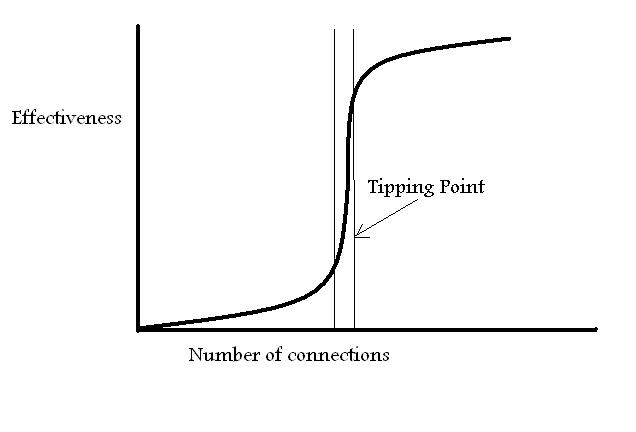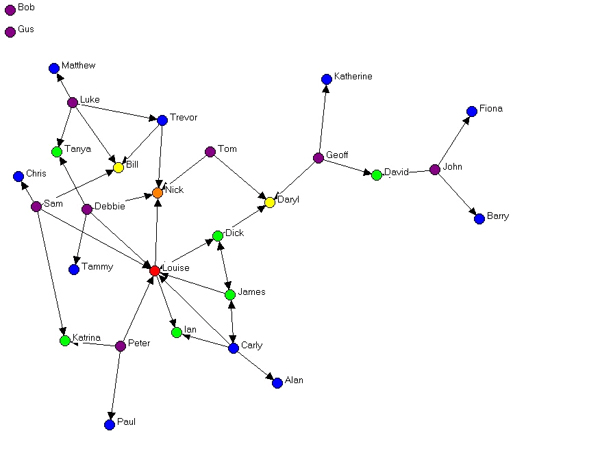Mavens, Connectors, Salesmen – Malcolm Gladwell
Posted by Orrin Woodward on January 16, 2008
I am re-reading a fantastic book I read several years back called The Tipping Point by Malcolm Gladwell. I believe the Team is at a tipping point and is about to explode and go mainstream. Gladwell calls a community tipping point a social epidemic and states that there is only a small percentage (5%) who create it. Gladwell documents three traits that cause an epidemic: contagiousness, little causes having big effects, and changes happening not
gradually but at one dramatic moment. The third trait is called a tipping point. There are three types of people involved in a social epidemic: Connectors, Mavens and Salesmen. Any business that expects to grow must focus on serving these three crucial catalysts—No business will survive long-term that mistreats these irreplaceable community influencers. Malcolm states:
In a social epidemic, Mavens are data banks. They provide the message. Connectors are social glue: they spread it. But there is also a select group of
people—Salesmen—with skills to persuade us when we are unconvinced of what we are hearing, and they are critical to the tipping of word-of-mouth epidemics as the other two groups.
To create a tipping point we need the thinking and actions of all three groups. Not long ago, I attended a conference in Hawaii where I heard Mr. Gladwell speak live. His concepts of the tipping point are mind expanding and ought to be read and understood by any company expecting to grow their market share. Let’s read what Gladwell has to say about the three categories of people involved in tipping points.
Connectors
What makes someone a Connector? The first—and most obvious—criterion is that Connectors know lots of people. . . Six degrees of freedom doesn’t mean everyone is linked to everyone else in just six steps. It means that a very small number of people are linked to everyone else in a few steps, and the rest of us are linked to the world through those special few. . . . In fact, I go down my list of forty friends, thirty of them, in one way or another, lead back to Jacob. My social circle is, in reality, not a circle. It is a pyramid. And at the top of the pyramid is a single person—Jacob—who is responsible for an overwhelming majority of the relationships that constitute my life. . . These people who link us up with the world, who bridge Omaha and Sharon, who introduce us to our social circles—these people on whom we rely more heavily than we realize—are Connectors, people with a special gift for bringing the world together.
In the graph below, notice how Louise connects almost every other person.
Mavens
The word Maven comes from the Yiddish and it means one who accumulates knowledge. In recent years, economists have spent a great deal of time studying Mavens, for the obvious reason that if marketplaces depend on information, the people with the most information must be the most important. For example, sometimes when a supermarket wants to increase sales of a given product, they’ll put a promotion sticker in front of it, saying something like “Everyday Low Price!” The price will stay the same. The product will just be featured more prominently. When they do that, supermarkets find that invariably the sales of the product go through the roof,
the same way they would if the product had actually been put on sale. . .
But if we’ll buy more of something even if the price hasn’t been lowered, then what’s to stop supermarkets from never lowering their prices? . . . The answer is that although most of us don’t look at prices, every retailer knows that a very small number of people do, and if they find something amiss—a promotion that’s not really a promotion—they’ll do something about it. If a store tried to
pull the sales stunt too often, these are the people who would figure it out and
complain to management and tell their friends and acquaintances to avoid the
store. These are the people who keep the marketplace honest. . . One name for them is “price vigilantes.” The other, more common, name for them is “Market Mavens.”
Salesmen
Part of what it means to have a powerful or persuasive personality, then, is that you can draw others into your own rhythms and dictate the terms of the interaction. . . . I felt I was becoming synchronized with him. . . . But the essence of the Salesmen is that, on some level, they cannot be resisted.
“Tom can build a level of trust and rapport in five to ten minutes that most people will take a half an hour to do,” Moine says of Gau. . . What was
interesting about Gau is the extent to which he seemed to be persuasive in a way quite different from the content of his words. He seems to have some kind of indefinable trait, something powerful and contagious and irresistible that goes beyond what comes out of his mouth, that makes people who meet him want to agree with him. It’s energy. It’s enthusiasm. It’s charm. It’s likability. It’s all those things and yet something more.
What role will you play in the tipping point of the Team leadership community? Are you a Connector, Maven or Salesmen/Saleswomen? Everyone plays a part on our way to 1 million and beyond! Our communities deserve the best and it is our responsibility to develop our gifts and skills. We all have roles to play and promises to keep!
God Bless, Orrin Woodward
3 Responses to “Mavens, Connectors, Salesmen – Malcolm Gladwell”
Sorry, the comment form is closed at this time.










Over 60 Countries Visiting Our Leadership Blog « Orrin Woodward Life Leadership Team said
[…] Who knows what the future has in store as we build a worldwide community. I consider myself a Maven—someone who does research in many areas to save people time and money for all of our benefits. […]
Marc said
Thanks, Orrin. I just finished the section on the three types of people and realized I am a Maven and struggle with Connector and Salesman roles. Now I realize I need to focus on finding Salesmen and Connectors to compensate for my weaknesses instead of just seeking out other Mavens as I have been. After reading the first section I put Tipping Point right up there with Personality Plus and Five Love Languages for understanding people.
Sherri Couey said
I am about 1/2 way through reading “The Tipping Point”. I think it is a fun read. I am enjoying it. If it wasn’t for being a subscriber to LLR/LIFE this particular book probably would not have made it to my library, along with many others I have received through the subscriptions. I didn’t realize how connected we all are to each other until I started reading this book. Thanks for the opportunities LIFE is providing me.